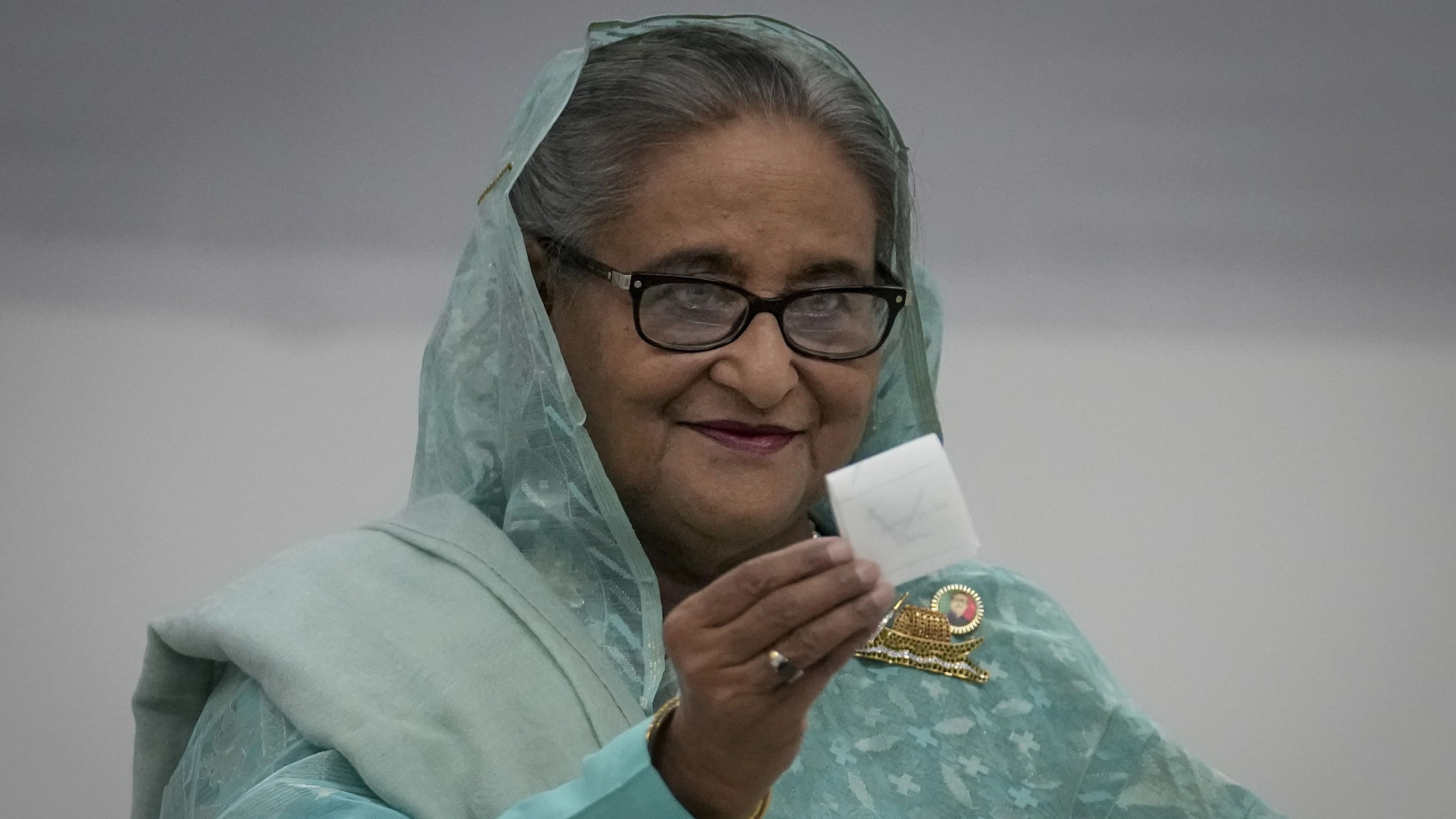
Bangladesh Prime Minister Sheikh Hasina shows her ballot paper as she casts her vote in Dhaka, Bangladesh, Sunday, Jan. 7, 2024.
Credit: PTI Photo
By Arun Devnath
Bangladesh Prime Minister Sheikh Hasina will retain her title as the world’s longest serving female head of government after her party swept more than half of the parliament seats in an election boycotted by her opponents and voters.
Hasina’s Awami League party won at least 157 of 299 seats for a simple parliament majority, according to two major television networks citing polling data. The election for one seat was postponed.
The Election Commission has put the turnout at about 40 per cent. It’s a sharp drop from the 80 per cent participation in polls in 2018, as voters heeded a campaign by the opposition Bangladesh Nationalist Party to shun the election and draw attention to the sweeping crackdown her government carried out in the run up to the polls.
The vote was the culmination of a monthlong campaign beset by daily street protests, the jailing of Nobel Peace Prize winner Muhammad Yunus and viral videos of ruling party leaders pushing voters to cast ballots or risk losing government benefits.
Dhaka was deserted with heavy security around voting centers and there were few reports of clashes between opposition supporters and police officials. In a sign the country was still on edge, Hasina, who is also the president of the Awami League, asked supporters not to organize rallies to celebrate the victory, according to party official Sayem Khan.
Hasina was upbeat during the polling, telling voters to exercise their democratic rights. “I’m determined to make sure that democracy continues,” she told reporters. “Without democracy, development work can’t continue.”
The 76-year-old leader is expected to hold a post-election briefing on Monday at 3 p.m., local media reported.
Hasina, who is set for a fourth straight term in power, has overseen one of the fastest-growing economies in the world and lifted millions out of poverty as part of her development agenda — achievements often overshadowed by her turn to authoritarianism.
Still, the economy is struggling with dollar shortages, which has prompted Moody’s Investors Service and others to downgrade Bangladesh’s credit ratings. The government was earlier forced to turn to the International Monetary Fund for $4.7 billion in emergency loans after the pandemic and soaring commodity prices depleted foreign exchange reserves.
About 120 million people were eligible to vote for 299 of the 350 seats in parliament. In recent weeks, prominent leaders from Awami League have been shown on social media video clips telling voters that they risked losing their benefits if they didn’t take part in the elections.
The BNP boycotted the national vote in response to Hasina refusing to step aside and allowing a caretaker government to run the poll. In response her Awami League party targeted a 50 per cent turnout and allowed some of its leaders to contest as independents to spur voter interest.
As polling stations closed, opposition leaders congratulated voters for not casting their ballots, according to the Daily Star.
“What we have been saying for the one year that the people of Bangladesh have turned down this government has been shown today before everyone in the country,” said BNP leader Abdul Moyeen Khan. “We’ll continue our movement together with the people in a peaceful process.”
Police arrested several opposition leaders in the months before the election. Hasina’s main rival and BNP leader Khaleda Zia faces suspended jail sentences on graft charges that her supporters say are trumped up.
Human Rights Watch said in a November report that almost 10,000 opposition activists have been arrested since a planned rally by the BNP on Oct. 28. Nobel winner Yunus was given a six-month jail sentence by a Dhaka court last week in a case his supporters say was politically motivated.